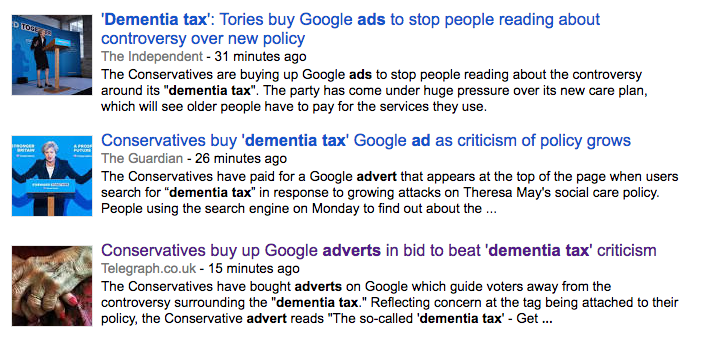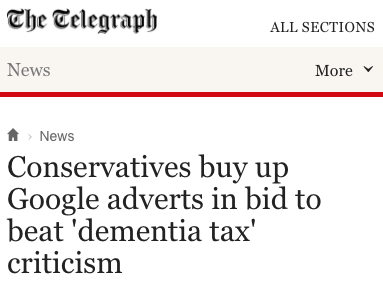The Conservatives have a problem: One of their party manifesto commitments, to change the way elderly care is paid for, has attracted the unwanted nickname of the "dementia tax".

The policy, which was unveiled alongside Theresa May's other policy proposals on Thursday afternoon, is an attempt to fix the widely accepted funding crisis in elderly care. Under the Conservative proposal, anyone who ends up needing expensive long-term care in a nursing home will have to pay for it themselves out of whatever assets they own – usually the value of a house – although the final £100,000 of value will be protected for their family to inherit.
Critics of the policy – on the left and right of politics – lashed out, dubbing it a "dementia tax", since people who die of long-term degenerative diseases which require expensive care such as dementia will lose the value of their homes, while people who die of other diseases such as cancer will receive free treatment on the NHS. Conservative candidates have already reported the policy has received a negative reaction from many of the party's core voters.
There's some dispute over who invented the term "dementia tax" but the decision by the Financial Times to run it as a headline on its Monday edition proves it has definitely gone mainstream.
The Conservatives' digital team attempted to fight back, buying up adverts that would be shown to people searching for "dementia tax" on Google.
The Tories are buying Google Ads against the term "dementia tax" which is neat but also, er, totally legitimises th… https://t.co/zoQAPsKfmf
This is quite neat from a technical campaigning perspective – people searching to understand the term they have heard on the news will instead be led to a policy document on the Conservatives' website.
But it has a downside: The Conservatives, perhaps unwittingly, legitimised the term in the process.
This then led to headlines such as this.
Tories buy Google ads to stop people reading about controversy over new policy https://t.co/W0807RhsFO
That's a little bit overblown – the Conservatives aren't trying to stop people reading about the "dementia tax", simply buying adverts next to search terms. But the majority of Google results for the term provide plenty of critical opinion, while this presents a much more positive vision.
Regardless, the decision to buy the adverts means every journalist can justifiably run a headline with the words "Conservatives" and "dementia tax" in it. The party has accidentally legitimised its own term of attack.

Even the pro-Conservative Daily Telegraph got in on the action.
Labour's digital team then hit back, outbidding the Conservatives on Google Ads to show a link to Labour's criticism of the policy.
@jimwaterson Labour has one as well
However, in what is potentially a sign of the Conservatives' online campaign budget, the Labour advert has now largely disappeared while the Tory one remains in place, although quite a lot of Labour supporters are urging the public to needlessly click the link and cost the Tories money.
@jimwaterson So if we all start searching Google for #DementiaTax and click it from different devices/locations, it… https://t.co/MqsMrr4xX6
In short, an attempt by the Conservatives to subtly counter the prevailing narrative on a controversial policy using clever online campaign tactics has inadvertently given the rest of the media a legitimate reason to use the term "dementia tax".

On the plus side for the Conservatives: Quite a lot of people will have clicked the link and read the counter-argument. On the negative side: They're now stuck with "so-called dementia tax" until polling day.
Other minor problem with this tactic is the term "so-called" which only ever prefaces bedroom taxes and murderous terrorist quasi-states.

